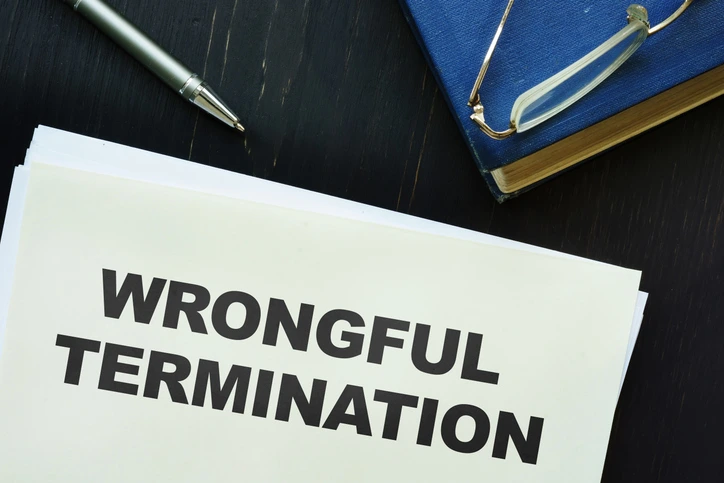In Need of a Wrongful Termination Lawyer?
We Fight for Your Employee Rights
At the Barkhordarian Law Firm, our lawyers represent employees throughout the Greater California who have had their rights violated, including those who have been fired for illegal reasons. While employers are generally given great discretion when it comes to hiring and firing their workers, under certain circumstances this firing may be in direct violation of federal law.
If you believe your employer has violated your contract in firing you or fired you for discriminatory reasons, our California wrongful termination lawyers are prepared to fight for your rights. We know our California and federal laws and can obtain backpay, compensatory damages, and more on your behalf.

Call or contact us online today to schedule a free consultation with a California wrongful termination attorney. We offer our legal services in English and Spanish.
What is Wrongful Termination?
Wrongful termination describes being fired for reasons that violate the law or your contract as an employee. While you can be fired for no reason at all if you’re employed at-will, you cannot be fired for an unlawful reason that is defined by local and state laws as well as your employee handbook.
Some illegal reasons for firing employees include:
- Retaliation: An employer can’t legally fire you to get back at you for something you did, such as report an instance of abuse or file some type of complaint. If you believe your employer fired you as a form of retaliation, you may be able to take legal action.
- Discrimination: Employees are protected from being discriminated against for factors such as race, ethnicity, color, religion, age, gender, sex, and disability, and being fired for one of these protected classes is itself a type of discrimination.
- Violation of employment agreement: If, for whatever reason, your employer is violating the terms of your contract by firing you, this can be considered wrongful termination. For example, some employment contracts specify that an employee can only be fired for specific reasons, so firing them for reasons other than those listed is unlawful.
What Qualifies as Wrongful Termination in California?
If you have been wrongfully terminated, it’s crucial to seek legal assistance from a California wrongful termination attorney without delay. The wrongful termination statute of limitations in California is two to three years from the date of termination, meaning time is of the essence. While California has at-will employment laws that allow employers to terminate employees without providing a reason, it’s essential to note that not all terminations are legal.
Wrongful termination cases throughout California encompass various scenarios, including:
- Discriminatory firing based on protected characteristics such as race, ethnicity, color, religion, age, gender identity or expression, sexual orientation, or disability status.
- Retaliation against an employee who has lodged a complaint regarding workplace safety conditions.
- Retaliation against an employee who has reported instances of misconduct like sexual harassment.
- Breach of an employment agreement by terminating an employee for reasons not explicitly stated in the contract.
- Termination of an employee due to their lawful medical leave.
- Refusal to rehire an employee upon their return from family or medical leave.
- Dismissal resulting from whistle-blowing activities, such as exposing employer fraud.
- Constructive dismissal, wherein the employer deliberately creates an intolerable work environment, effectively coercing the employee to resign.
Should you suspect that your employer has violated any of these laws during your termination, it is imperative to promptly consult with a wrongful termination lawyer near you. By doing so, you can protect your rights and explore potential legal recourse. Remember, if you delay taking action, you may risk exceeding the statute of limitations and forfeit your ability to pursue a legal claim.
Common Types of Retaliation
Retaliation is one of the most frequent types of wrongful termination our team has seen, and there are various reasons why employers retaliate against their employees—all of them illegal. Some employers fire employees for reporting or complaining about sexual harassment. Sexual harassment is as pervasive as it is against the law in the workplace, and your employer is obligated by California law to create a workplace that is free of sexual harassment. If they fire you because you reported harassment or instigated an investigation, they can be held responsible.
Your employer also can’t fire you for taking family medical leave, which you’re entitled to as an employee. California law protects employees who have been retaliated against for using their sick leave, whether to care for a loved one, diagnosis, or treatment of an existing health condition. If you’re fired within 30 days of your sick leave request, this can be presumed to be wrongful termination, and your employer has a responsibility to prove that the termination was for some other reason. Employers have also been known to fire employees when they file for workers’ compensation after an illness or injury.
Finally, the third type of retaliation we often see is whistleblowing. If you reported a violation of local, state, or federal laws, such as unsafe working conditions, this is considered whistleblowing.
What Damages Can I Recover?
We understand that if you’ve been fired, you’ve likely accrued some losses. Now that you no longer have a job, you may be missing out on wages and benefits, and you’re likely experiencing some mental anguish, too. Our lawyers meet personally with our clients to understand just how much they’ve lost in order to collect the compensation they deserve.
Some damages we can recover for employees who have been wrongfully terminated include:
- Backpay and wages
- Lost wages and benefits
- Compensation for emotional distress
- Attorney fees
We Also Focus on the Following Areas:
Contact a California Wrongful Termination Attorney Today
Sometimes, employees can be awarded punitive damages, which are issued to punish wrongdoing by employers that is considered to be willful or malicious. Hiring an attorney to handle your case is important because your employer may have arguments ready to undermine your claim. One common argument employers use to lower the value of an employee’s claim is that they could’ve found similar employment after termination, or that they didn’t try hard enough to regain employment. Our lawyers are prepared for these types of arguments and can challenge them on your behalf.
Frequently Asked Questions (FAQ)
Get Answers From Our California Wrongful Termination Lawyers
What should I do after being wrongfully terminated?
How long do I have to file a wrongful termination lawsuit?
Wrongful termination lawsuits are subject to a legal deadline commonly known as a “statute of limitations.” Since employees are protected by both state and federal laws, several statutes of limitations may apply depending on the specific type of claim you are bringing. Generally speaking, workers in California have two to three years to file a claim. If the termination is related to a breach of contract or public policy, you have two years from the date of termination to commence legal action. If your firing was in retaliation for a whistleblower claim, you have three years to file a claim. This list is not exhaustive, however, as there are several situations that can extend or limit the amount of time you have to pursue a claim. Since complying with the statute of limitations period can ultimately make or break your claim, it is critical you speak to an attorney as soon as possible after being terminated to ensure your rights are protected.
What is wrongful constructive termination?
Under California law, it is possible for employees to sue their employers for wrongful termination even if they have not actually been fired yet but are being intentionally subjected to working conditions that are so intolerable that a reasonable employer would expect a reasonable employee to resign, and the employer otherwise would not have been within his/her rights to terminate the employee outright due to a contract or public policy. This is known as “wrongful constructive termination” or “wrongful constructive discharge.” Wrongful constructive termination cases are very similar to ordinary wrongful termination cases and allow employees to seek the same or similar types of damages.
Do employers have to give employees advance notice before conducting mass layoffs?
In some cases, yes. California’s California’s Worker Retraining and Notification (WARN) Act requires employers to provide employees with 60 days notice before conducting a mass layoff of 50 or more employees. This law applies to all employers with at least 75 employees. If an employer fails to provide adequate notice under these guidelines, laid-off employees may sue for wages and benefits for the amount of time by which the notice fell short.
